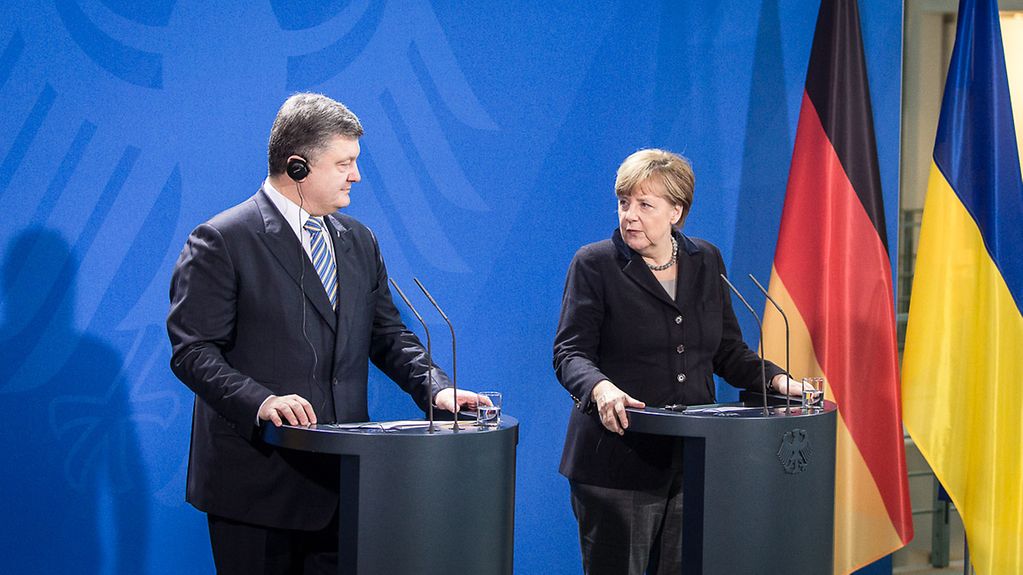Ukrainian President in Berlin
The Chancellor is continuing to push for a peaceful solution to the conflict in eastern Ukraine, on the basis of the Minsk agreements. After almost a year the agreements have still not been fully implemented. Angela Merkel has discussed the issue with the Ukrainian President Petro Poroshenko in Berlin.
3 min reading time

Germany and France intend to stand by Ukraine and support it, says Chancellor
Photo: Bundesregierung/Denzel
"The Minsk agreements are the basis on which we want to continue to work," reaffirmed Chancellor Angela Merkel in Berlin, where she met with the Ukrainian President Petro Poroshenko.
Petro Poroshenko has consistently affirmed his support for the implementation of the Minsk agreements, said Angela Merkel before their meeting. Germany and France, she said, intend to continue to stand by Ukraine and support it in this process. However, said the Chancellor, almost one year after the negotiations ended in Minsk, it must be noted that "there is regrettably still no lasting ceasefire".
The foreign policy advisor of French President François Hollande also attended the meeting. Germany and France have been working closely for about one and a half years to bring a peaceful solution to the conflict in eastern Ukraine as part of the Normandy group.
On 6 June 2014 Chancellor Angela Merkel met with Vladimir Putin, Petro Poroshenko and François Hollande in Normandy, where they were attending celebrations to mark the seventieth anniversary of the D-Day landings. It was the first time the Russian and Ukrainian heads of state had met since the crisis began. Since then, meetings involving representatives of the four nations have been referred to as Normandy format meetings.
Minsk agreements are still the basis for a solution
A sustainable ceasefire is the precondition for implementing the list of agreed measures, said Angela Merkel, although hostilities have lessened, and "much has been achieved".
"But the true political agreements are still outstanding," noted Angela Merkel. Efforts are now focusing on pushing ahead with constitutional reform in Ukraine. In this context, it must be determined with Russia within the Trilateral Contact Group how the local elections in Donetsk and Luhansk are to be held.
The Minsk agreements aim to bring peace and security to a sovereign Ukraine. Following an initial agreement in September 2014, a package of measures was agreed on 12 February 2015. The 13-point plan provides primarily for a ceasefire, the withdrawal of heavy weapons and the establishment of buffer zones between the parties to the conflict. Preparations are also to be made for political reforms and free elections.
For local elections in line with OSCE standards
On the agenda were preparations to hold local elections in eastern Ukraine. "We agreed here – as provided for in the Minsk agreement – that the elections must comply with OSCE’s Office for Democratic Institutions and Human Rights (ODIHR) standards," Angela Merkel reminded her audience. The aim is to organise the next steps as well as possible.
In this context it is important, she said, to achieve a genuine ceasefire. Over and above this there is an expectation that the OSCE observers are given access to the entire eastern Ukraine, also along the border to Russia. "It is high time that progress was made here."
Sanctions linked to the implementation of the Minsk agreements
Sanctions imposed on Russia are linked to the implementation of the Minsk process. The sanctions had to be extended, explained Angela Merkel, "because the Minsk process has not yet been implemented". The Chancellor made it quite clear that, "We believe it would be in the interests of all parties if the Minsk agreements were realised and thus the preconditions put in place for the sanctions to be lifted. Unfortunately we’re not quite there yet."
Support on economic issues
Germany will continue to provide strong support for Ukraine within the scope of the action plan adopted in 2015. A sum of 700 million euros has already been provided, "and our support will continue in 2016," assured Angela Merkel. The transformation process, the implementation of the reforms and the IMF programme are imposing a massive burden on many people in Ukraine. "We want to try to revive the Ukrainian economy as swiftly as possible," pledged the Chancellor.